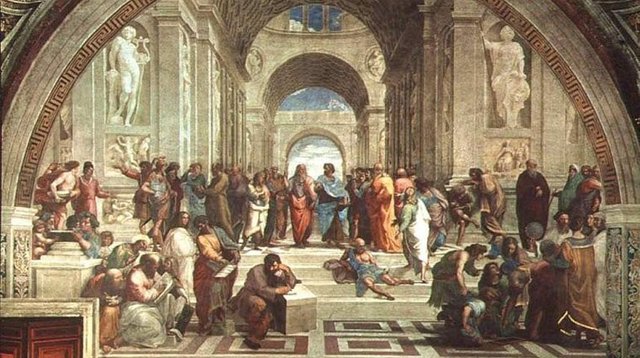Ancient philosophy. Life and creativity of Socrates. /part 7/
Socrates realizes there is no evidence of God's existence and finds the supersensible universal reason in his own consciousness and distinguishes him from himself, as the universal from the private. Knowledge, understanding, reason can not be exhausted by the single mind. "Do you think there is anything reasonable in you, and there is nothing reasonable outside of you? You know, of course, that your body contains within it small particles of earth and water, which in themselves are so great; you also know that it is composed of small particles from the other great elements. How do you think that, by chance, by yourself, you have in yourself the whole mind that is not there anywhere else, and that all that exists in its infinite magnitude and countless multitude is made up of the blind, unreasonable power? " Thus, reason is universal and so separate from its private manifestations.
The reason is essentially moral, practical. World Reason, General Intelligence is the moral consciousness of man as a universal Deity acting in nature. His actions must be undoubtedly good, reasonable, expedient. The very presence of the ideal, the common goal in the moral consciousness of the universal unwritten laws of moral order, testifies to the superlative and good reason. When he finds divine Reason in his soul in philosophical self-knowledge, Socrates everywhere seeks him, indicating his traces in the whole of nature. Its universal uniqueness in the endless and living difference, the orderly order of the universe, the expedience in the structure of the organisms all point to the precedents of Socrates the unity and reason of the root cause. This is where the teleological evidence of God's being, drawn from the perception of the purposeful nature. The penetrating philosopher carefully examines the works of Anaxagoras, the natriphilosophical hypotheses of the previous Hellenic sages, and the views of the sophists, but remains unsatisfied.
"One day I heard someone who had read a book on Anaxagor, which said that Mind is the governor and the Causer of all things. So I was happy for this reason, and I thought that the "mind is the cause of everything" (it's about Anaxagor, the translation of the translation) to a certain extent is correct. And I thought that if this is the case, the mind that regulates everything will arrange and place everything as best as it can. And if someone decides to find out why, why each individual thing is born, lost, or exists, then you have to find out how it is better for it to exist, or to suffer or do anything else. For this reason, Socrates continues, "one should not pay attention to anything else - as to himself and to the other things - except the most perfect and the best.It is necessary to know the bad, because it is the subject of the same knowledge. By reason of this, filled with joy, I thought I found myself in Anaxagor, a teacher who would reveal to me the causes of everything that exists, in keeping with my own mind. " Obviously, Socrates seeks in the doctrine of the rational foundation of being logically consistently developed the teleological principle, and from it also draws the idea of God.
In fact, Socrates initially welcomed Anaxagor that "Nous" was understood as a constructor of the world and as a reason. Some interpreters of the history of philosophy from a newer one time understand the central concept of "Nous" in Anaxagor as "endless, all-encompassing spirit," as well as "Weltordner," or as "a substance he thinks" (Denkstoff)

The mind has endless powers.
You got a 11.32% upvote from @emperorofnaps courtesy of @godflesh!
Want to promote your posts too? Send 0.05+ SBD or STEEM to @emperorofnaps to receive a share of a full upvote every 2.4 hours...Then go relax and take a nap!